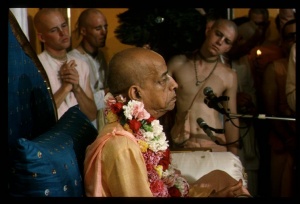SB 10.13.64: Difference between revisions
m (1 revision(s)) |
No edit summary |
||
| Line 1: | Line 1: | ||
{{info | {{info | ||
|speaker= | |speaker=Śukadeva Gosvāmī | ||
|listener=King | |listener=King Parīkṣit | ||
}} | }} | ||
[[Category:Srimad-Bhagavatam - Canto 10 Chapter 13]] | |||
[[Category:Bhagavatam Verses Spoken by Sukadeva Gosvami - Vanisource|101364]] | |||
<div style="float:left">'''[[Srimad-Bhagavatam]] - [[SB 10|Tenth Canto]] - [[SB 10.13: The Stealing of the Boys and Calves by Brahma|Chapter 13: The Stealing of the Boys and Calves by Brahmā]]'''</div> | |||
<div style="float:right">[[File:Go-previous.png|link=SB 10.13.63]] '''[[SB 10.13.63]] - [[SB 10.14.1]]''' [[File:Go-next.png|link=SB 10.14.1]]</div> | |||
{{RandomImage}} | |||
==== TEXT 64 ==== | ==== TEXT 64 ==== | ||
<div | <div class="verse"> | ||
śanair athotthāya vimṛjya locane | :śanair athotthāya vimṛjya locane | ||
mukundam udvīkṣya vinamra-kandharaḥ | :mukundam udvīkṣya vinamra-kandharaḥ | ||
kṛtāñjaliḥ praśrayavān samāhitaḥ | :kṛtāñjaliḥ praśrayavān samāhitaḥ | ||
sa-vepathur gadgadayailatelayā | :sa-vepathur gadgadayailatelayā | ||
</div> | </div> | ||
| Line 17: | Line 22: | ||
==== SYNONYMS ==== | ==== SYNONYMS ==== | ||
<div | <div class="synonyms"> | ||
''śanaiḥ''—gradually; ''atha''—then; ''utthāya''—rising; ''vimṛjya''—wiping; ''locane''—his two eyes; ''mukundam''—at Mukunda, Lord Śrī Kṛṣṇa; ''udvīkṣya''—looking up; ''vinamra-kandharaḥ''—his neck bent; ''kṛta-añjaliḥ''—with folded hands; ''praśraya-vān''—very humble; ''samāhitaḥ''—his mind concentrated; ''sa-vepathuḥ''—his body trembling; ''gadgadayā''—faltering; ''ailata''—Brahmā began to offer praise; ''īlayā''—with words. | |||
</div> | </div> | ||
| Line 24: | Line 29: | ||
==== TRANSLATION ==== | ==== TRANSLATION ==== | ||
<div | <div class="translation"> | ||
Then, rising very gradually and wiping his two eyes, Lord Brahmā looked up at Mukunda. Lord Brahmā, his head bent low, his mind concentrated and his body trembling, very humbly began, with faltering words, to offer praises to Lord Kṛṣṇa. | Then, rising very gradually and wiping his two eyes, Lord Brahmā looked up at Mukunda. Lord Brahmā, his head bent low, his mind concentrated and his body trembling, very humbly began, with faltering words, to offer praises to Lord Kṛṣṇa. | ||
</div> | </div> | ||
| Line 31: | Line 36: | ||
==== PURPORT ==== | ==== PURPORT ==== | ||
<div | <div class="purport"> | ||
Brahmā, being very joyful, began to shed tears, and he washed the lotus feet of Kṛṣṇa with his tears. Repeatedly he fell and rose as he recalled the wonderful activities of the Lord. After repeating obeisances for a long time, Brahmā stood up and smeared his hands over his eyes. Śrīla Viśvanātha Cakravartī Ṭhākura comments that the word locane indicates that with his two hands he wiped the two eyes on each of his four faces. Seeing the Lord before him, Brahmā began to offer prayers with great humility, respect and attention. | Brahmā, being very joyful, began to shed tears, and he washed the lotus feet of Kṛṣṇa with his tears. Repeatedly he fell and rose as he recalled the wonderful activities of the Lord. After repeating obeisances for a long time, Brahmā stood up and smeared his hands over his eyes. Śrīla Viśvanātha Cakravartī Ṭhākura comments that the word ''locane'' indicates that with his two hands he wiped the two eyes on each of his four faces. Seeing the Lord before him, Brahmā began to offer prayers with great humility, respect and attention. | ||
</div> | |||
''Thus end the Bhaktivedanta purports of the Tenth Canto, Thirteenth Chapter, of the Śrīmad-Bhāgavatam, entitled "The Stealing of the Boys and Calves by Brahmā."'' | |||
<div style="float:right; clear:both;">[[File:Go-previous.png|link=SB 10.13.63]] '''[[SB 10.13.63]] - [[SB 10.14.1]]''' [[File:Go-next.png|link=SB 10.14.1]]</div> | |||
__NOTOC__ | |||
__NOEDITSECTION__ | |||
</div> | |||
__NOTOC__ | |||
Revision as of 15:02, 20 May 2021

A.C. Bhaktivedanta Swami Prabhupada
TEXT 64
- śanair athotthāya vimṛjya locane
- mukundam udvīkṣya vinamra-kandharaḥ
- kṛtāñjaliḥ praśrayavān samāhitaḥ
- sa-vepathur gadgadayailatelayā
SYNONYMS
śanaiḥ—gradually; atha—then; utthāya—rising; vimṛjya—wiping; locane—his two eyes; mukundam—at Mukunda, Lord Śrī Kṛṣṇa; udvīkṣya—looking up; vinamra-kandharaḥ—his neck bent; kṛta-añjaliḥ—with folded hands; praśraya-vān—very humble; samāhitaḥ—his mind concentrated; sa-vepathuḥ—his body trembling; gadgadayā—faltering; ailata—Brahmā began to offer praise; īlayā—with words.
TRANSLATION
Then, rising very gradually and wiping his two eyes, Lord Brahmā looked up at Mukunda. Lord Brahmā, his head bent low, his mind concentrated and his body trembling, very humbly began, with faltering words, to offer praises to Lord Kṛṣṇa.
PURPORT
Brahmā, being very joyful, began to shed tears, and he washed the lotus feet of Kṛṣṇa with his tears. Repeatedly he fell and rose as he recalled the wonderful activities of the Lord. After repeating obeisances for a long time, Brahmā stood up and smeared his hands over his eyes. Śrīla Viśvanātha Cakravartī Ṭhākura comments that the word locane indicates that with his two hands he wiped the two eyes on each of his four faces. Seeing the Lord before him, Brahmā began to offer prayers with great humility, respect and attention.
Thus end the Bhaktivedanta purports of the Tenth Canto, Thirteenth Chapter, of the Śrīmad-Bhāgavatam, entitled "The Stealing of the Boys and Calves by Brahmā."